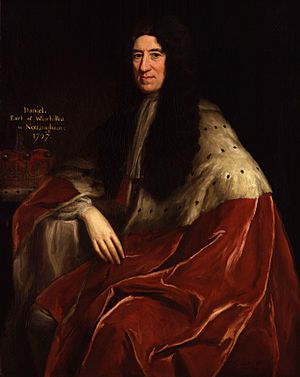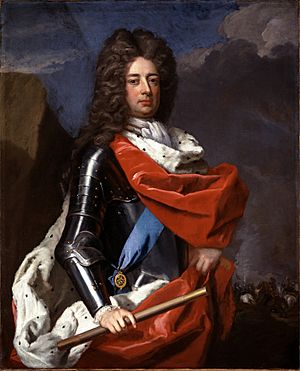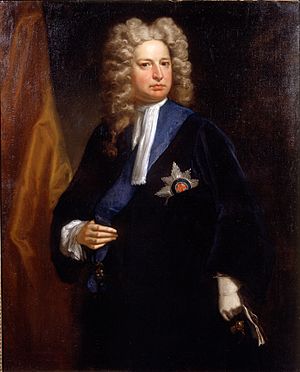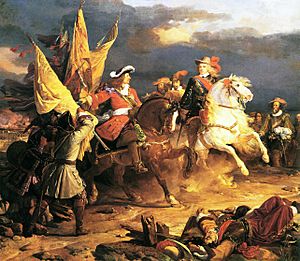No Peace Without Spain facts for kids
No Peace Without Spain was a very popular British political slogan in the early 1700s. It was used during the War of the Spanish Succession (1701–1714), a big war that Britain was heavily involved in. The slogan meant that Britain would not agree to a peace treaty with its main enemy, Louis XIV of France, if Philip, the French king's grandson, was allowed to remain the King of Spain. This phrase became a powerful cry for those who opposed the Tory government led by Robert Harley, Earl of Oxford and the peace terms of the Treaty of Utrecht.

How the Slogan Started
The phrase was first widely used by a Tory politician named Lord Nottingham in the British Parliament in December 1711. However, it was quickly adopted by the rival Whig political group. The Whigs were seen as the "war party" because they wanted to keep fighting, while the Tories were the "peace party."

The Whigs were encouraged by the victories of the British commander, the Duke of Marlborough, in the Low Countries (modern-day Belgium and Netherlands). The Whigs demanded that King Louis XIV of France stop trying to expand his power. They also wanted him to give up any plans to make Spain a country controlled by France, like a "satellite state" (a country that is officially independent but is controlled by another more powerful country).
Even though the slogan started in London, it spread to other allied countries. It showed that the allies wanted to achieve even more from the war than they had originally planned.
The War in Spain
The war in Spain started well for the side supporting the Austrian candidate, Archduke Charles. British forces captured Gibraltar in 1704 and Barcelona in 1705. They also gained support from Portugal and Catalonia.
However, it soon became clear that the French candidate, Philip V, was much more popular in Castile (a large part of Spain) than Archduke Charles. The allied forces had to leave Madrid in 1706 and suffered a big defeat at the Battle of Almanza in 1707.
In 1708, the new British commander, James Stanhope, captured the island of Minorca. This island was more useful to Britain than Archduke Charles's chances of becoming King of Spain. Philip's forces later took back Alicante in April 1709. They also defeated a combined British and Portuguese army at La Gudiña in May. After this, Portugal made a quiet agreement to stop fighting, which allowed trade to restart.
In 1710, the allies tried again and won battles at Almenar and Saragossa. They captured Madrid in September. But the local people didn't support them, so Charles entered an almost empty city. The allies were cut off when Portuguese forces couldn't cross into Spain.
In November, the allied armies left Madrid. At Brihuega on December 9, 1710, Stanhope's forces were surprised and had to surrender. The next day, Philip's army defeated another allied force at Villaviciosa. These defeats were a huge blow to the allies' hopes in Spain.
In April 1711, Emperor Joseph I died. His brother, Archduke Charles, became the new Holy Roman Emperor Charles VI. This meant that if Charles also became King of Spain, he would rule a huge empire. Britain didn't want one ruler to have so much power, whether French or Austrian. This made many people think there was no point in continuing the war.
The Treaty of Utrecht
A new Tory government, led by Robert Harley, took power in 1710. This government wanted to end Britain's involvement in the expensive European war. They started to pull out of the conflict, which led to the dismissal of the war-supporting Marlborough. He was replaced by the Duke of Ormonde.

France, which was also struggling, was eager to talk about peace. A big problem had been an earlier demand that King Louis XIV use force to remove his own grandson from the Spanish throne. After long talks, an agreement was reached. It included a compromise peace in Spain. This allowed Philip to remain King of Spain, but Britain gained control of Gibraltar and Minorca. Britain then pulled its forces out of the war in both Flanders (a region in Europe) and Spain.
The terms of the Treaty of Utrecht were strongly opposed by the Whigs when they became known. Jonathan Swift wrote a book called The Conduct of the Allies to defend the Tory government's actions. There was even a famous duel, the Hamilton-Mohun Duel, between a Whig supporter and a Tory supporter, where both men were killed. The Tories claimed it was a Whig plot to stop the peace agreement.
The Whigs were still very angry about what they saw as giving up on Spain. The slogan "No Peace Without Spain" became a popular rallying cry against the Treaty and the Tory government. To get enough votes in the House of Lords, which the Whigs mostly controlled, the government created twelve new Tory peers. These new peers were known as "Harley's Dozen." Even with this, Parliament voted to approve the Utrecht terms.
Britain's former allies, like Austria and the Dutch Republic, tried to keep fighting, still using the slogan "No Peace Without Spain." But they suffered defeats without Britain's money and military help. The allies then reluctantly agreed to peace terms with France. While these terms were a successful end to the war, they were less than what the allies had hoped for a few years earlier.
Philip was recognized as King of Spain, but he had to give up important lands to the Emperor in Austria. The allies then pulled their last forces out of the Iberian Peninsula (Spain and Portugal). The final fighting in Spain happened when the last anti-French stronghold, Barcelona, fell after a long siege.
What Happened Next
In 1714, George I, the ruler of Hanover (one of the allies who had opposed leaving Spain), became the new British king. George removed the Tories who had pushed for the compromise peace. He rewarded those who had opposed the Treaty of Utrecht with positions in his government. These were mostly Whigs, though the Tory Nottingham, who first used the slogan, was included. Marlborough was put back in charge of the army. General Stanhope, a Whig who had fought in Spain and strongly opposed the peace, became a chief minister and helped shape Britain's foreign policy after the war.
However, something unexpected happened. Britain soon made an alliance with France. Before long, the two countries were fighting together against a stronger Spain under Philip. Philip was trying to undo the Treaty of Utrecht and get back territories he had lost. This war ended with Spain's defeat, but Philip kept his throne. The Tories used this as proof that their original peace policy was successful.
Some younger Whigs, like William Pitt, believed that the compromise peace led to the later Bourbon Family Compact (an alliance between France and Spain). This alliance caused Britain many problems throughout the 1700s.
Even though the "No Peace Without Spain" debate was very important at the time, historians have often focused more on Marlborough's campaigns in Flanders than on the war in Spain.
 | Kyle Baker |
 | Joseph Yoakum |
 | Laura Wheeler Waring |
 | Henry Ossawa Tanner |


